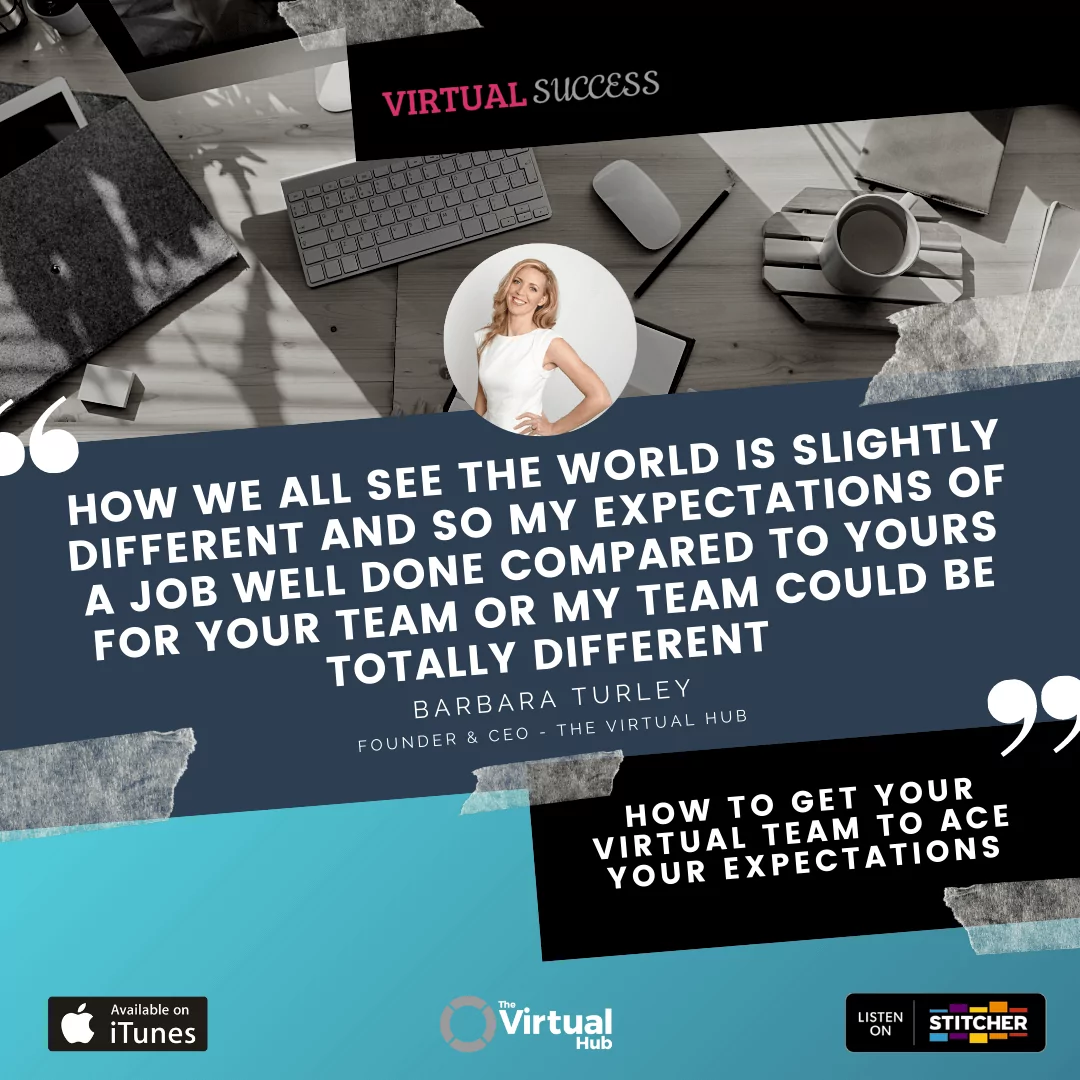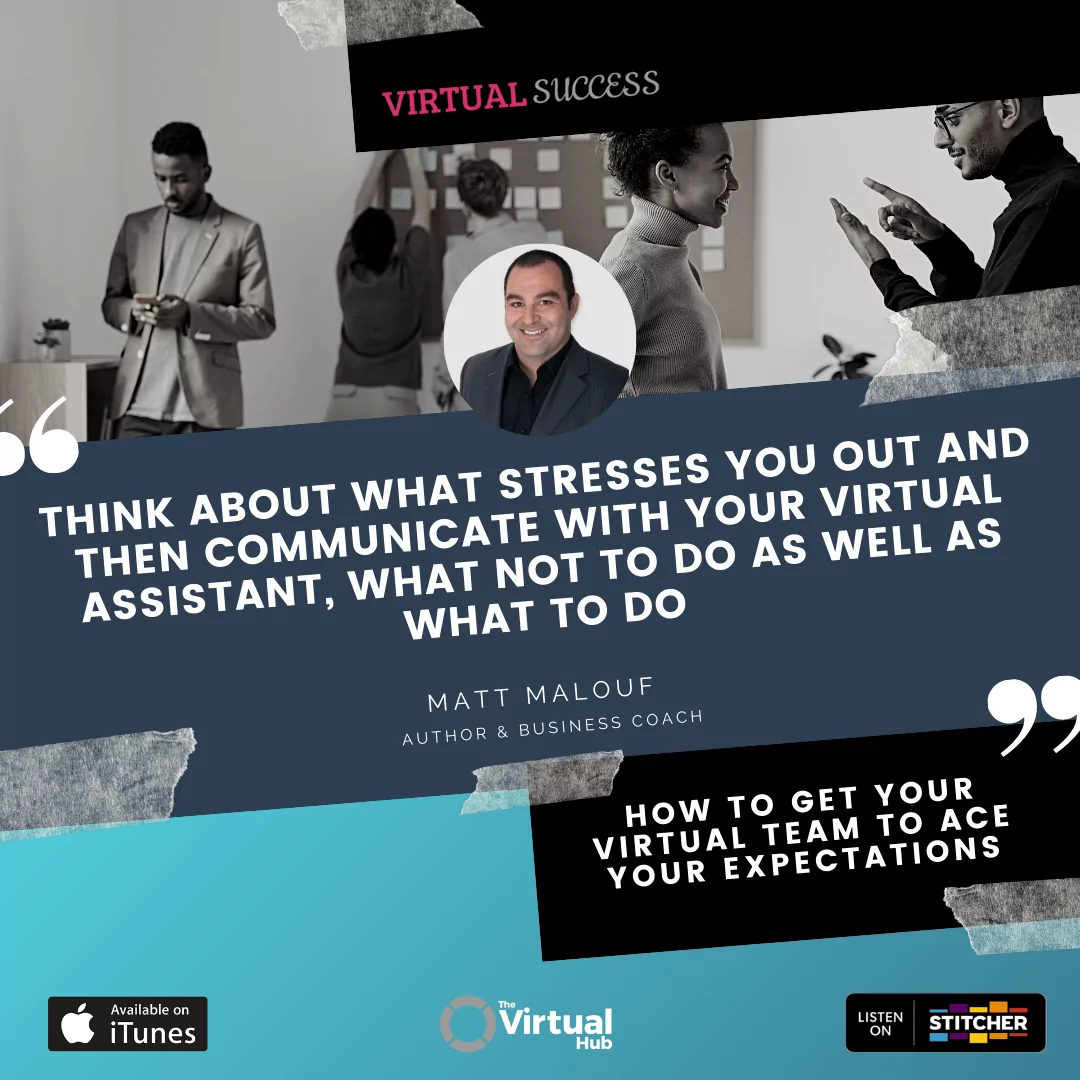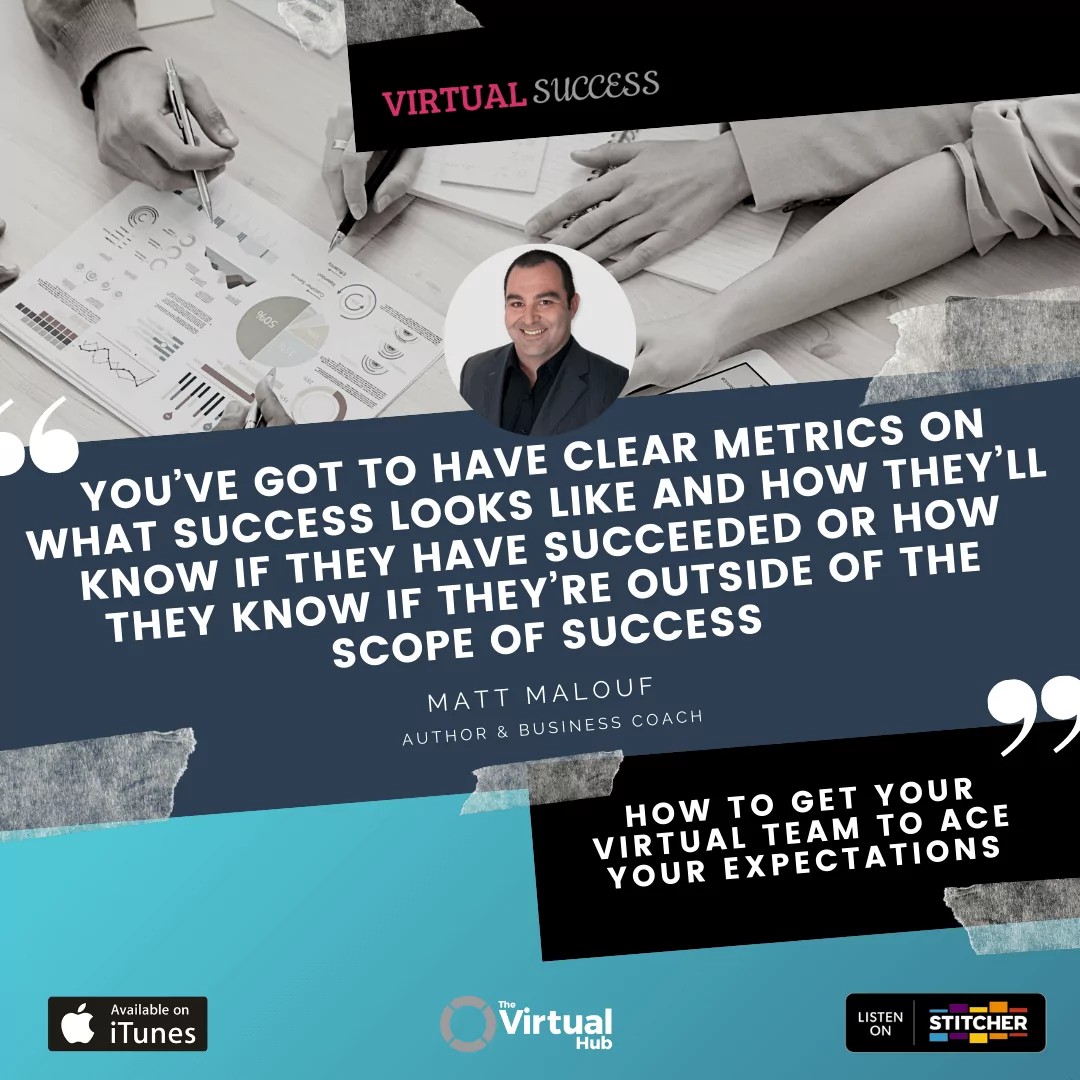How To Get Your Virtual Team To Ace Your Expectations
Want the transcript? Download it here.
In this episode, we talk about how get your virtual team to ace your expectations by defining what your expectations really are.
A common frustration experienced by many entrepreneurs when implementing virtual team members is that they don’t do what is expected of them.
To help solve this, in this episode we share:
- How to define your expectations.
- How to measure “success”.
- Communicating expectations – how to clearly articulate these to your team members.
- Are the expectations realistic for the roles you are employing your team members for.
Let us know what your key takeout has been from this episode and join the continuing conversation over in the Virtual Success Facebook Group.
In this episode:
02:36 – Clearly defining your expectations
04:40 – No-one can read your mind
05:36 – How to define your expectations
07:26 – Clear communication is key
10:00 – Don’t just think it, write it down
13:02 – Help them, help you
14:06 – What does success look like?
15:24 – Communicate clearly, assume nothing
17:49 – Communicating your expectations
18:22 – Document your expectations
20:32 – The good and the not so good
21:24 – Being clear on what failure looks like
25:33 – Unrealistic expectations of your VA
26:36 – Help your VA grow
28:55 – Wrapping things up
Matt: Welcome everyone to today’s episode and I’m joined by my co-host Barbara Turley. Hey Barb, how are you doing today?
Barbara: Hey Matt! Good and how are you?
Matt: Excellent, excellent! I’m really, really looking forward to today’s show. I think there are so many amazing topics – I think I say that every week that I’m really looking forward to the show but I’m just thoroughly enjoying the conversation and the education that we’re providing to the community.
Barbara: Me too, you know and it’s funny because I know we chat off-air all the time, we talk about just the depth of stuff that we need to discuss because every show we do, we’re like, ‘Ah we need to do a whole show on that little piece, or this little piece’, and that’s how all these shows are coming together, so it’s fantastic.
Matt: Absolutely, absolutely! How’s your week been?
Barbara: Good! You know, busy as always but I’m starting to implement some of the things that we’re actually talking about on the show and I’m really starting to see great results with our virtual teams, so it’s really useful and would say to the listeners, you know, implement this stuff! Really listen to what we’re talking about here because we’re actively doing it every day in our businesses and its working. How about you Matt? What’s been happening for you?
Matt: You know it’s been great. We’re always adding to our team which is great. We’ve now got people literally all over the world and that amazes me how, like what you were talking about, through implementation of the strategies that we talked about, I can literally work from my home office and have people, we’ve got people in America, we’ve got people in the Philippines, New Zealand, all around Australia and we’ve got people in Europe as well. So it’s just, it’s exciting. Really, really exciting!
Barbara: And I think the other thing to note here is, it absolutely can be done and very simply because a lot of people think that sounds really complicated. But actually, I’m just loving having a big team you know, most of mine are in the Philippines at the moment but I’m loving having them all over the place, we’re all connected online. With the technology today you can really do it and it makes my life simpler rather than more complicated.
Clearly defining your expectations
Matt: It sure does, it sure does. So today’s topic, we want to talk around expectations and what we want to focus in on in the theme of expectations is, have you clearly defined your expectations of your virtual team or virtual team members and do they understand how to fulfil and meet your expectations.
Barbara: You know Matt, this is such a great topic because it’s something I’ve seen a lot obviously in Virtual Angel Hub. I see this happen all the time, where often as we’ve talked about it before, we have the same VA working on different accounts and different outcomes, different experiences and feedback coming – some positive, some negative and often it comes down to expectations. When I look in to the account and actually had chat with the clients, the expectation management is key to get right! So I’m excited to talk about this too with you.
Matt: Absolutely and I just want to frame what we want to cover in today’s podcast, what we’re going to talk about is how to define your expectations. I think it’s unconscious to many people that they never articulate and clearly define what they expect. We also then want to understand how to measure success against expectations, or what does success look like? We are then going to talk about communicating expectations and how to clearly articulate that to your virtual team and then making sure that the expectations that you have are realistic for the roles that you’re employing your virtual team or inviting your virtual team members to join your team around. So they are the four topics I think we’re covering in today’s podcast. So why don’t we get straight into it Barb and let’s starting talking about how to define and articulate your expectations as an owner, leader or manager in a business?
No-one can read your mind
Barbara: You know what I found interesting about this? You know as humans, it’s human nature to automatically assume that everybody thinks the same way you do. Of course this has been the downfall of many a marriage, many a business partnership, you know many relationships fall down with this that we don’t realize that how we all see the world is slightly different and so my expectations of a job well done compared to yours for your team or my team could be totally different. And similarly for the team member, they might have a different view of what success looks like or what they’re expectations of you are as a leader. So I think defining this is something we naturally don’t gravitate to doing but it is absolutely so vitally important to do but it’s very difficult to do. So, as a coach Matt, how do you get clients to define what their expectations are?
How to define your expectations
Matt: For me it falls under three umbrellas – the first is ‘what’s important to me?’ Me as the owner, me as the leader. What are the things that are important to me? And again, as you just mentioned, it is different to everybody. For some people it is important to have constant contact, constant communication, almost micro management. For others it’s about having the deadline met when they said it was going to be met. For others it’s about thinking outside the box and problem solving. But getting clear on what’s important to you and what’s important for your team to do, that’s number one.
I think number two in defining expectations is understanding what leads to success in a task or what leads to success in a role and defining the expectations around that so that you set your people up to succeed and to quote-on-quote, win.
And I think the third thing to consider when defining your expectations is what defines or equates to value for you when this person is performing their role at an outstanding level? What’s valuable to you? What’s going to give you the sense that you’ve got a positive return on investment and not just, you know, wasting cash?
Barbara: That’s a very good point actually! That is a really, really good one which I think a lot of people probably don’t think about. Well subconsciously we kind of know what our view on that is but we never really articulated it to our teams. So sometimes our teams are doing things that we don’t really value.
Clear communication is key
Matt: Absolutely! And I thought I would share a couple of examples of expectations that I have with our virtual teams. One of the core values that we have in our business is that we’re solutions focused so an expectation that I have is that, they can come to me with any challenge or any problem that they’re experiencing but they must come with at least one solution. So any of my team may come to me and they may go, ‘Hey Matt! This is where the problem is or this is what I’m experiencing’, and they know that the first question if they’re don’t already say it in that sentence is, ‘So what’s your solution?’.
Barbara: Yeah that’s a great one! So you’ve told them that that’s really important to you.
Matt: Absolutely! And particularly new team members, they learn this real fast that if they don’t have a solution, I’ll tell them to call me back once they’ve thought of one.
Barbara: Yeah that’s great! I’m going to start implementing that one, I love that idea.
Matt: Yeah. But for others it’s not as important. For others, I know business owners that want to solve every problem.
Barbara: Yeah, I don’t want you wasting time looking at solutions when I already have the solution and actually sometimes that’s what happens to me. I find some of my virtual team get, I call them the research vortex, when there’s a problem that comes up, they don’t know what to do and they go into the research vortex and then two hours later they emerge with a possible solution. That’s not really the best solution and in 5 minutes I could’ve given them the answer. So there’s a slight difference actually with my team, I often say to them, ‘Come to us first because we probably have the answer’.
Matt: Absolutely! And the amazing thing is, both work.
Barbara: Both do work, yeah! And it’s about communicating actually so one rule we have internally is, step one is you come straight to us and then, step two is if we don’t know the answer straight away then you have to go and find the solution. So they’re very clear on that. But I’ve noticed actually with some clients as well, you know that thing you were saying, some people love constant communication, others hate it and we’ve actually witnessed that with our clients. You know sometimes our VAs think that they are doing a great job because they’re in constant contact and communicating effectively and asking questions and the client is going nuts because they’re really busy, they’re in meetings all day and they just don’t want that, they just want the outcome at the end of the day as opposed to the constant communication all day, others love it.
Don’t just think it, write it down
Matt: And so it reinforces the point where, it’s not just thinking about these things, it’s actually writing it down and then going through it with your people so that they understand, we’re not mind readers so they need to be clear on what you expect.
Barbara: And I actually just have an add-on to that Matt, sorry I just thought of this. Not only being clear on what you expect, but why? So, for example, in the case of a client that is busy all day, running around the city doing meetings, if you say to your virtual team member, ‘Look! I just don’t want you contacting me all day long via Skype messages.’ It’s much better to say, ‘I’d rather you didn’t contact me all day long in Skype messages because I tend to be in and out of meetings so I’m generally unavailable. And it can be quite difficult for me if it’s pinging all the time.’ So I think for them to fully understand why you have this expectation, makes it easier for them first, to remember and second of all, to respect.
Matt: Absolutely!
Barbara: One I think is a great one as well is asking yourself and I asked myself this one, this is why I do this, ‘what stresses me out?’. So, for example, one of the expectations I have with my VAs is we use a project management system called Asana and in there I love creating systems, so I’ve got you know full recurring tasks lists, daily, weekly, monthly tasks and I say to them, ‘If a task is on a daily basis then my expectation is that if it goes off with no problems, I still want you to tick the task off so I can see it being completed. But if there’s an issue or anything that’s happened, I want you to document that in the comment section. Because I’m quite busy all day and what I like to do is at the end of the day, in the evening or on the weekend, I’ll often flick through the Asana lists and I want to get a quick update and I want to get a quick update without having to chase you for the answer’. So they all know why I want it done this way and that means that they don’t go, ‘Oh the task has been done, it doesn’t matter! I won’t tick it off’, or they know why this is important to me because it stresses me out otherwise, if they don’t do that.
Matt: Yeah I think what you said at the end that ‘it stresses you out’ and I think that is so many relationships between virtual team member or manager or owner because the owner is getting stressed out by the VA either doing something or not doing something. So a really and clear and easy way to define those expectations is think about what stresses you out and then communicate with your virtual assistant, what not to do as well as what to do.
Help them, help you
Barbara: You know help them, help you! So if you say when I’m really busy, this is something that actually can stress me out, they might even say I might snap, I might be sharp. So in order to just get rid of this problem for you and for me, it would be great if you would do this every day.
Matt: We could show that little clip from Jerry Maguire on that one Barb, ‘Help me, help you!’
Barbara: Yes exactly! Yeah, yeah!
Matt: I think that gives everyone really simple framework now to start to identify what you expect and the only thing I will say to that is – write it down!
Barbara: I was going to say that, yeah! You have to write this down because if it’s in your head, it’s not communicated properly. If you even say it, it’s probably not communicated properly. It needs to be documented! And you can use it as a KPI, you know, one of the KPIs on the performance matrix that you then measure your staff with can be these KPIs.
What does success look like?
Matt: Absolutely, which leads us into point two, which is ‘what does success look like?’, or ‘how do we measure it?’ How will your virtual assistant or virtual team understand whether they are meeting or not meeting your expectations, in light of the example that you gave earlier around the tasks in Asana, you’ve either put the comment in or you haven’t and I like that because it’s black and white. You’ve either ticked it off or you haven’t. You know what I mean?
Barbara: And if you haven’t, it’s going to invite a comment from me saying, ‘What happened here?’, because it’s not done! Even though it probably was done.
Matt: Exactly and I think that this is really important from a management perspective in managing both virtual and local people is that you got to have a clear metrics. You’ve got to have clear metrics on what success looks like and how they’ll know if they have succeeded or how they know if they’re outside of the scope of success. This is very, very simple. Do you know what I mean? It doesn’t have to be over the top and we’re not looking for fancy ways to record everything, it’s just understanding here’s what I expect and here’s the metric for success and here’s the metric for failure, quote-on-quote.
Communicate clearly, assume nothing
Barbara: I’ll give you a story on this success thing because I’ve actually seen this quite a lot because again you know some of us, I mean I’m a bit of a control freak and I’ll totally admit it. I think most of us entrepreneurs kind of are deep down, you know, we’re a little bit control freaky and we can be perfectionists and we really know how we want things done, but I’ve seen this happen – I’ve actually a few client-VA relationships unravel because of expectations around what success looks like not being communicated properly.
So, for example, this one client, she was very particular about her newsletter, which of course is her branding, her colours and fonts, all that sort of thing. And the VA was very good, she was sending back beautiful newsletters, they were all fine but the fonts she had used were different from the fonts on her website and the client used to go ballistic about this and you know I sat down with both of them and said, ‘Well we need to talk about first why this is important to you but also success in anything to do with the branding for this business means you need the exact color codes not something that looks similar, you need the exact font to be used all the time on any communication that goes about this business, that font is to be used and if you can’t use it, we need to know about it!’ So things like that, you know that actually solved the problem because the VA all of a sudden realized that this was so important to this particular client and that she was being unsuccessful because she wasn’t, she didn’t know that was such a key metric.
Matt: It’s interesting isn’t it?! Something that is so simple and that could be assumed when communicated effectively sets somebody up to win.
Barbara: Exactly, then you go from wanting to fire the VA to actually getting a total rock star in your team and that can be the difference between a rock star and someone who fails.
Matt: 100%! My thought just on this second point is ‘keep it simple’. It’s got to be measurable, it’s got to be black and white. There can’t be a grey area because the grey is where this will come undone and then it makes it really hard for you and for them. So keep it simple and as I said, keep it black and white.
Barbara: Absolutely!
Communicating your expectations
Matt: So I think the third point then is around communicating your expectations. So you’ve now articulated your expectations, you’ve got measures around what success looks like and doesn’t look like and now it’s like, ‘How do I communicate to my team and team players what I expect? And how it’s going to be measured?’ And for me Barb on this, a conversation with a written document attached to it, in my opinion is the easiest way.
Document your expectations
Barbara: And a written document is the bit most people won’t do. That’s where the downfalls happen, they have a chat and what I’m finding is yes the conversation was great but a chat is different to a meeting. What I notice people do is they have a chat and the chat gets caught up then report building and how’s your day and personal stuff and then we throw in a few lines around, ‘Okay my expectations are this!’ and kind of gets lost in translation. They’re almost needs to be an allocated meeting to discuss expectations and the list of you know how are we going to measure this together and then it’s very clear.
Matt: Well in my opinion actually is the first thing that needs to happen. With all of our new team members that come onboard in any of our companies, I’ll spend the first hour with them because inevitably they’ll report to me in some way, shape or form. The first thing I go through with them is our mission, vision and values and then the second thing is what I expect and what the measures are around that. And when I’m communicating that with them, and they have a written document that I send and get them to read beforehand, I then get them to repeat back to me their understanding of what I expect.
Barbara: Yeah that’s great! I would say nobody does that because you know I’m not even doing that, I need to do that. That’s very good!
Matt: Because again, remembering that for a lot of these virtual assistants, English is a second language and even if English isn’t a second language, all of us, all human beings put a filter on the communication. We put a filter on so we hear it differently than it may be meant.
Barbara: Absolutely, yeah! I definitely agree with that one.
Matt: So in order to set them up to win, you need them to repeat back to you their understanding of what you expect. Their understanding of what they’re going to be measured against, their understanding of what success looks like.
The good and the not so good
Barbara: Would you even go as far, Matt, in this conversation, it’s just something that popped into my head now, as to kind of also lay out, I don’t like to call it unacceptable behavior but it’s like the, what things if they do it are probably going to trigger very serious conversations. Not saying it in a serious way but more again, being clear about what those situations would look like!
Matt: I think you raise a good point. It’s not something I’ve done personally, but it’s certainly something I’ve just written down, I think it’s a fantastic idea. I would probably, again I think this is going to depend on your style, and I think for everyone it’s slightly different. As you were talking then Barb, my thought was what’s acceptable, what’s outstanding and what’s unacceptable? That is how I would position it.
Being clear on what failure looks like
Barbara: So no confusion over…I mean the reason I raised it is because it’s actually something we’ve started to implement literally in the last couple of weeks. And it has ruffled some feathers but going forward, we need to be very clear about what our expectations are because I was communicating a lot about what expectations for success look like. Well actually now I’m also communicating what failure looks like also. So that they’re very clear, first of all whether they want to stay with this company and second of all whether they can meet that and if they can then how not to fall into holes. Because sometimes people make mistakes, you know they fall into little traps without realising it. So setting them up to really win so that you also set them up not to fail, tell them what failure looks like.
Matt: Yes, I think it’s a great idea, giving them both ends of the spectrum, I think it makes sense. And just following on from this too, I just want to add another point. I mentioned earlier, when I’ve got new team members it’s the first thing I go through. If you haven’t gone through this with your people and now you’re going to implement this, you need to expect that there’s going to be some, you’re going to ruffle some feathers and people are going to feel uncomfortable with this because all of a sudden..
Barbara: You get resistance, that’s what I have found when it’s done too late, resistance!
Matt: 100% and I think anytime you’re raising the standards or changing what’s going on, you’re going to get that resistance and so it’s being clear and I think it’s what you mentioned earlier Barb – let them understand why you’re doing this and how it’s going to help them and you.
Barbara: Yeah I mean one of the things that I started saying when I started to have these conversations and there has been resistance, even if it’s just a mood, this resistance, and how I’ve sort of broken that down is to say, ‘Look, you know, the company is growing, we’re growing quite rapidly and we’ve got a great team growing, the culture is fantastic and in order for it not to fall over when things get very busy, we’re starting to just put these few extra bits in place, so we’d love if you could help us to implement and, you know, just to watch out for these issues if it’s happening to you’. And it’s sending a very clear but very nice message. It’s quite a supportive way of saying it but I’m saying a very clear message, that if you are doing this right now, you probably need to stop!
Matt: Yeah I love that!
Barbara: So I’m not saying they’re doing it but you know there can be things, you know messing around things on Facebook like that. I don’t mind a bit of that but the clear expectations are absolutely key. And Matt, I wanted to touch on an area, this is something I know we’ve talked about before as well. So getting clear on the expectations, defining it, making sure that you’re both very clear what success looks like, what failure looks like and why and writing it all down. But what about when we get to a situation where your expectations are completely out of alignment with the level of the role. So, for example, you’ve hired a VA and you want them to be a digital strategist – your expectations might be misaligned with the role.
Matt: Yeah I think that’s a great point. If that is the case when you go through this exercise then you may need to look at a restructure within your organization. It’s certainly going to articulate and make clear to you why that relationship probably isn’t working and then you got the opportunity now to go and find and match the right person with the right skillset to what you expect and what you need. So sometimes it might be a restructure internally, sometimes you may have to let a few people go and re-employ based on now what you do expect from the role.
Unrealistic expectations of your VA
Barbara: Yeah and also I think realizing, obviously a lot of people and a lot of clients that we have, we hire VAs because they’re offshore, they’re very talented and very skilled, never underestimate particularly the Filipino Vas, that’s what I always say. But having said that, I’ve noticed some people confusing a cheaper staff member with a strategist or a coach, not necessarily a coach but more of somebody who can think of strategy for them. And I always try to, in my sort of measuring expectations on the way in, I always say to them they can implement a lot for you but they cannot come up with an idea for you. Certainly not in the early days anyway. After a year of working together, I mean my VAs come up with fabulous ideas for me, they’re almost strategist at this point, but that’s because I’ve built them into that rather than they started out that way!
Matt: Absolutely! Look, it’s like what our friend Chris Ducker talks about in his book, the whole super VA…
Barbara: It’s the super VA, yeah!
Help your VA grow
Matt: You know and I think that if that’s your expectation, you will be let down, you will be let down! You’re going to find some outstanding people that have amazing skillsets that are going to come and work out with you. Often though it comes down to your ability to train, mentor and help them grow that will take them from being a good performer, to an outstanding performer. I know one of the things that we’ve done in our business around this, we’ve got some great people who love learning and one of the things I’m always trying to learn about my people, I think that’s one thing if you want to take people to the next level, learn what interests them. I’ve got some of my VAs that love learning, they love online, etc. I’ve purchased Facebook advertising courses before with the intension of rolling out Facebook Ads in our businesses. And given them access and said, ‘Can you please go away and watch this, learn what we need to do, share with me what you need me to do and I’ll let you do the rest.’ And the amazing thing is these people coming in were not Facebook trained, certainly had very little, if any, skillset around Facebook advertising but are now what I would deem ‘experts’ and love it because I’ve given them the opportunity to learn and grow.
Barbara: Absolutely yeah! Absolutely and then when you make the environment also safe for them to come up with ideas and to actually suggest things and also to get things wrong, you know, to come up with ideas that maybe aren’t going to work or whatever, but you want to create an environment where they can actually explore their own ideas as well and you just be open to their ideas. And that’s another expectation you could set. If your expectation is that you want them to show initiative then you have to create an environment where there is space and time for them to do that and also the training that they may need to get to that point.
Wow Matt, we thought this was going to be a short show! But this is a tricky topic actually and its one that people really struggle with.
Wrapping things up
Matt: Absolutely! And you know what? I think just in wrapping up, let me reiterate what I think the four most important things are:
Number one – getting clear on what your expectations are and writing them down. I can’t say that enough, you must write them down. Don’t just think about it, you need to write it down.
Number two – getting clear metrics about what success and what failure looks like around meeting or not meeting your expectations.
Number three – making sure you communicate the expectations with your team both having the written version in front of them and verbally and getting them to repeat back to you their interpretation of what you’ve communicated to them, and
Number four – making sure that your expectations are realistic for the role that you’ve invited them in to your business to fill. Are they in the right seat on the bus? Does their skillset serve your expectations and the business? And getting clear on that!
So, I loved this episode Barb! Thank you for your time and your contributions, really it’s been great.
Barbara: Yeah, this is fantastic! It’s even refining my own processes as we talk about it. I know you and I have both been taking little notes going, ‘Oh must implement that one!’ Because even though we are talking about these topics together, you’re constantly learning. There’s always opportunity to learn new tweaks and new things and I guess that is what the show is all about just you know taking these tips and implementing them and actively doing them and I know Matt you’ve done this with your virtual teams, I’m doing this with virtual teams and this stuff works, it really, really works! And the people who get success, what I’m seeing are people who actually take this stuff and implement it and the people who tend to flounder with this or even outright fail are the people who think they can just keep going a hundred miles an hour and never slow down to actually do this little bit of work in order to get leverage later! Plenty to talk about in our upcoming shows Matt!! I’m excited!!
Matt: Me too!
Barbara: Next week!
Matt: Have an amazing week Barb, I’ll talk to you then.
Barbara: See you then!
Matt: See you!
The Hosts
 Matt Malouf
Matt Malouf
Matt Malouf is a passionate business coach, speaker, author and entrepreneur on a mission to help entrepreneurs around the world break the shackles of mediocrity and reach new levels of personal and business success.
 Barbara Turley
Barbara Turley
Barbara Turley is the Founder & CEO of The Virtual Hub, a company that specializes in recruiting, training and managing superstar ‘Virtual Assistants’ in the social media, digital marketing and systems automation space.





 Matt Malouf
Matt Malouf Barbara Turley
Barbara Turley